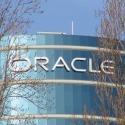Oracle barely shows up on the charts of biggest IaaS providers. The vendor is looking to change that.

Oracle set its sights on cloud infrastructure leader Amazon Web Services on Sunday, introducing a new cloud platform to combine the elasticity of private cloud with the performance, security and regulatory compliance of on-premises computing.
Larry Ellison, Oracle's founder and CTO, announced the new services from the opening keynote at Oracle OpenWorld, the company's big customer conference, which kicked off Sunday.
Oracle's major competitors are now Amazon Web Services Inc. for infrastructure and Workday for applications -- where in the past they were IBM for infrastructure and SAP for applications. That signals a shift in the industry, and for Oracle. "This is a breathtaking change," Ellison said. "It means people are moving from buying on-premises to buying in the cloud, and a whole new set of competitors."
Oracle competes on all three levels of the cloud: applications-as-a-service, platform, and now it is moving into infrastructure-as-a-service.
Oracle isn't well known for its IaaS cloud platform. Indeed, you might say that while AWS is Oracle's biggest competitor, the reverse isn't true; Oracle isn't Amazon's biggest competitor. Oracle barely competes with Amazon at all.
AWS, Microsoft, IBM and Google combined control well over half of the worldwide cloud infrastructure service market, and they're growing faster than their smaller competitors, according to a Q2 2016 study released by Synergy Research Group. Amazon is "in a league of its own," with nearly three times the size of its nearest competitor, Synergy says. Oracle isn't even singled out separately in Synergy's results, lumped in the "Next 20" category with companies including Alibaba, AT&T, BT, CenturyLink and Fujitsu.
Oracle is looking to change that, with Ellison highlighting a global buildout of redundant data centers for performance and reliability that he says beats Amazon. In particular, Oracle's latest data centers have double the cores, and multiples of storage and memory of Amazon.
"But you have to be willing to pay less," Ellison quipped, saying Oracle charges less than AWS.
Even as applications move from on-premises to cloud, basic values are unchanged, Ellison said. Enterprises require low cost, reliability, and especially security.
"Guess what? Our next presidential election might be decided by Vladimir Putin," Ellison said, through leaked American email that US intelligence officials believe were caused by a cyber attack orchestrated by Russia.
Security "might be the single most important issue" migrating from on-premises data centers to the cloud, Ellison said.
And a hybrid cloud model will be important as customers run mission-critical applications both in the public cloud and on-premise.
That's where Oracle Cloud@Customer Service comes in. Oracle provides a customer premises installation of the same hardware server and software stack that Oracle uses in its public cloud. "We install the machines behind your firewall and attach them to your network," Ellison said. "It's an extension of our public cloud that sits on your data center floor."
Want to know more about the cloud? Visit Light Reading Enterprise Cloud.
Oracle announced a suite of cloud services including Exadata Express database software, priced starting at $175 per month, as well as cloud native tools for building cloud applications, support for containers, a visual development environment, chatbot development tools, analytics, big data and Internet of Things applications.
Oracle also announced a Customer Insights and Engagement Cloud Service, to collect application usage by user and analyze customer behavior based on Oracle's own database of 5 billion consumer profiles -- bigger than Facebook's, Ellison said.
Also on the agenda were security tools, including acquisition of cloud security startup Palerra. (See Oracle Buys Palerra to Boost Cloud Security.)
Related posts:
— Mitch Wagner, 
 , Editor, Light Reading Enterprise Cloud
, Editor, Light Reading Enterprise Cloud
About the Author(s)
You May Also Like











